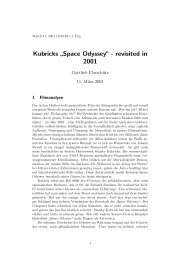Henry M. Taylor, 'Frames, Cons, and Double-Crosses - Cinetext
Henry M. Taylor, 'Frames, Cons, and Double-Crosses - Cinetext
Henry M. Taylor, 'Frames, Cons, and Double-Crosses - Cinetext
Create successful ePaper yourself
Turn your PDF publications into a flip-book with our unique Google optimized e-Paper software.
trics, illusions <strong>and</strong> the self-reflexivity of mise-en-abîme should play a crucial role. Because effec-<br />
tively, the actor on stage is always already part of a scenario written by someone else, always al-<br />
ready written: ―The 'work' you [the actor] do 'on the script' will make no difference. That work<br />
has already been done by a person with a different job title than yours. That person is the author.<br />
The lines written for you should be said clearly so that the audience can hear <strong>and</strong> underst<strong>and</strong><br />
them. Any meaning past that supplied by the author will come from your intention toward the<br />
person to whom they are said.‖ 11 Thus, acting, stripped of its idealistic aspects of character inte-<br />
riority, <strong>and</strong> always self-consciously performing pre-written scripts, has a deliberately mechanical<br />
quality: ―It is the job of the actor to show up, <strong>and</strong> use the lines <strong>and</strong> his or her will <strong>and</strong> common<br />
sense, to attempt to achieve a goal similar to that of the protagonist. And that is the end of the ac-<br />
tor's job. [...] Actors must be trained to speak well, easily, <strong>and</strong> distinctively, to move well <strong>and</strong> de-<br />
cisively, to st<strong>and</strong> relaxedly, to observe <strong>and</strong> act upon the simple, mechanical actions called for by<br />
the text.‖ 12 Hence Mamet can say: ―Invent nothing, deny nothing, speak up, st<strong>and</strong> up, stay out of<br />
school.‖ 13<br />
Contrary to the realist school of ―characters expressing themselves,‖ Mamet in a reflexive<br />
mode folding back on itself conceives of illusionary characters, characters-as-actors, in effect, ac-<br />
tors seen to be acting; rather than probing their – in his view noexistent – inner depths, their ac-<br />
tions are externalized <strong>and</strong> fundamentally antagonistic: ―it is the progress of the outward-directed<br />
actor, who behaves with no regard to his personal state, but with all regard for the responses of<br />
his antagonists, which thrills the viewers. Great drama, onstage or off, is not the performance of<br />
deeds with great emotion, but the performance of great deeds with no emotion whatever.‖ 14 This<br />
conception of performance – both on stage <strong>and</strong> in film – is characterised by an innate aggressive-<br />
ness, in the original Latin sense of the word, as purposefully, decisively, <strong>and</strong> energetically moving<br />
towards a goal; hence also the importance throughout of Mamet stressing the importance of the<br />
actor's willpower to become extroverted. This is another instance of his admonition to be out-<br />
ward-directed: ―The more you are concerned with yourself, the less you are worthy of note. The<br />
more a person's concentration is outward, the more naturally interesting that person becomes. [...]<br />
The person with attention directed outward becomes various <strong>and</strong> provocative.‖ 15<br />
Again, this ties in with the view of acting as being a craft, physical work, like that of the<br />
boxer, the dancer, or the singer, not intellectual insight or interpretation, <strong>and</strong> good acting consist-<br />
ing of the actors' communicating to the audience in the simplest <strong>and</strong> clearest form the play, the<br />
5



